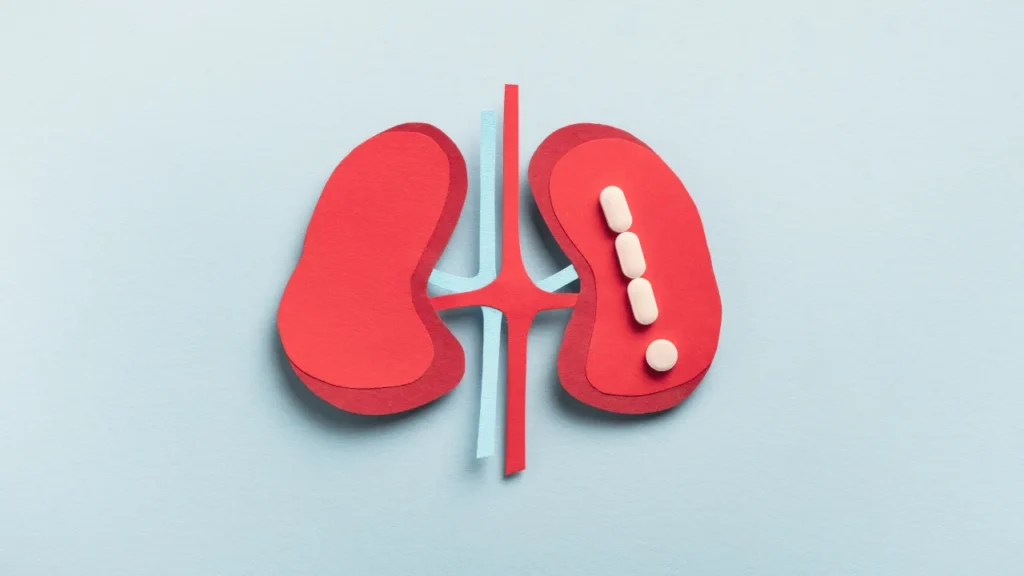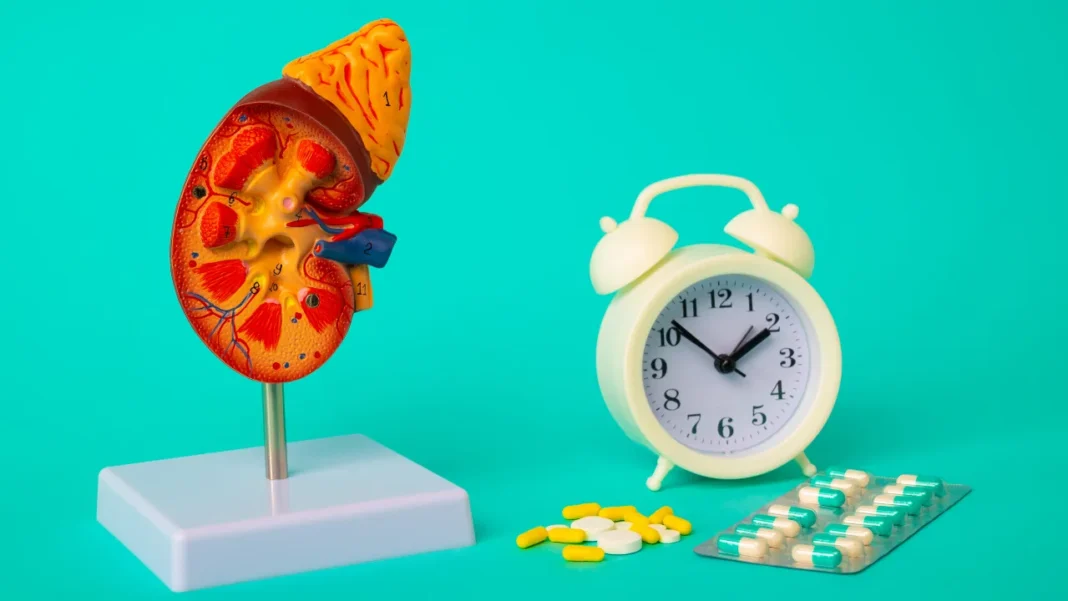Description
IgA nephropathy, commonly known as Berger’s disease, constitutes one of the most prevalent varieties of glomerulonephritis, a collection of kidney disorders affecting the glomeruli. Glomeruli are the small blood arteries in the kidneys that are in charge of removing waste materials and extra fluid from circulation. The accumulation of immunoglobulin A (IgA) deposition in the glomeruli, which causes inflammatory reactions and damage to these important structures, is the hallmark of IgA nephropathy. Normally, IgA antibodies fight infections. However, in cases of aberrant IgA nephropathy, these antibodies build up in the kidneys, prompting an autoimmune reaction that can lead to kidney inflammation and possibly even renal damage.
You May Also Like:
Hurst’s disease / acute hemorrhagic leukoencephalitis (AHLE): Description, Causes, and Treatment Protocol
Hashimoto’s thyroiditis / chronic lymphocytic thyroiditis / autoimmune thyroiditis: Description, Causes, and Treatment Protocol
IgA nephropathy / Berger’s disease: Description, Causes, and Treatment Protocol is an original (MedNewsPedia) article.
Possible Causes
While the exact cause of IgA nephropathy remains unclear, several potential factors contribute to its development that are as follows:
Abnormal Immune Reaction: An aberrant immune system response is thought to be the main underlying cause of IgA nephropathy. The immune system produces an antibody called IgA to combat infections. An anomaly in the structure or functioning of IgA leads to immune complexes that accumulate in the kidneys in people with IgA nephropathy. Damage to the kidneys results from an inflammatory reaction triggered by these deposits.
Genetic Predisposition: There is substantial evidence that IgA nephropathy has a hereditary component. Because the illness frequently runs in families, family history matters. An elevated risk of IgA nephropathy is linked to specific genetic variants or mutations. Nonetheless, the inheritance pattern is intricate, and several genes could influence it.
Vitamin D supports kidney function and immune modulation in IgA Nephropathy—Order Now on Amazon!

Environmental Triggers: IgA nephropathy is believed to be triggered by or made worse by environmental factors, especially infections. Viral or bacterial infections of the respiratory or gastrointestinal tract can activate the immune system and produce aberrant IgA antibodies. Kidney inflammation may be exacerbated by these antibodies accumulating in the kidneys.
Gut-Related Aspects: According to several studies, there may be a connection between IgA nephropathy and immune system anomalies in the gut mucosa. Immune dysregulation associated with the gut or alterations affecting the gut microbiota may impact the onset or course of the illness.
Abnormal IgA Formation and Clearance: The accumulation of IgA proteins within the kidneys may be caused by imbalances in the body’s production and elimination of IgA antibodies. IgA can accumulate in the kidneys due to altered metabolism or elimination, which can trigger an immunological reaction and inflammation.
Other Factors: IgA nephropathy may be influenced by many additional factors that increase its risk or progression, such as:
Dietary Influences
Food-related factors may affect the course of the disease even though they do not cause IgA nephropathy directly. In vulnerable people, diets high in protein or specific dietary patterns may affect kidney function.
Lifestyle Factors
In people who are prone to IgA nephropathy, smoking and some drugs, like nonsteroidal anti-inflammatory medications (NSAIDs), may make kidney damage worse.

Exacerbating and Mitigating Factors
The progression and treatment of IgA nephropathy are significantly influenced by aggravating and alleviating factors. By being aware of these factors, people can take precautions against exacerbating renal damage or delaying the course of the illness. Some of these factors are as follows:
The exacerbating factors involve:
High Blood Pressure or Hypertension: When IgA nephropathy is present, uncontrolled or improperly managed hypertension may accelerate kidney damage. Over time, more damage to the kidneys’ filtering units, or glomeruli, results from increased blood pressure.
Obesity: Increased body weight and obesity are associated with an increased risk of renal disease progression. Renal impairment may worsen as a result of obesity-related variables including insulin resistance and persistent low-grade inflammation.
Hematuria and Proteinuria: IgA nephropathy frequently manifests as persistent hematuria (blood in the urine) and proteinuria (protein in the urine). If left untreated, high amounts of hematuria and proteinuria can worsen the condition and suggest more serious kidney injury.
Smoking: The advancement of kidney disease, especially IgA nephropathy, has been linked to tobacco use. Smoking can make inflammation worse and make renal function worse.
Certain Medications: Nonsteroidal anti-inflammatory drugs (NSAIDs) can potentially worsen kidney function in individuals with IgA nephropathy by affecting renal blood flow. Avoiding NSAIDs or using them cautiously under medical supervision is advisable.

The mitigating factors involve:
Blood Pressure Management: Controlling hypertension is essential for reducing IgA nephropathy’s rate of development. Drugs like angiotensin II receptor blockers (ARBs) and ACE inhibitors are frequently administered to help decrease blood pressure and shield the kidneys from additional damage.
Nutritional Adjustments: Certain dietary changes, such as reducing protein intake or controlling potassium and phosphorus intake, may be recommended to promote overall renal health and reduce the pressure on the kidneys.
Healthy Lifestyle Modifications: The functioning of the kidneys can be improved by leading a balanced diet, exercising frequently, and keeping a healthy weight. Blood pressure can be regulated and kidney strain can be lessened with a diet reduced in processed foods and salt.
Consistent Observation and Follow-up: It is crucial to regularly check kidney function with blood, urine, and follow-up visits with a healthcare professional. Effective illness management is made possible by prompt intervention and therapy modifications made possible by monitoring.
Medication Management: Preventing drugs that may impair kidney function is crucial, particularly nonsteroidal anti-inflammatory drugs. For any prescription, including over-the-counter pharmaceuticals and supplements, always get medical advice before beginning or terminating use.

Standard Treatment Protocol
Maintaining kidney function and reducing the rate at which kidney disease advances are the main objectives of treating IgA nephropathy. The following are some of the approaches commonly used in standard treatment:
Blood Pressure Control: The development of IgA nephropathy must be slowed down by controlling excessive blood pressure. To control blood pressure and safeguard renal function, doctors frequently prescribe drugs like angiotensin II receptor blockers (ARBs) or angiotensin-converting enzyme (ACE) inhibitors.
Proteinuria Management: Medications like ARBs or ACE inhibitors can also help minimize protein losses through the kidneys if there is a large case of proteinuria (excessive protein found in urine).
Immunosuppressive Therapy: Immunosuppressive treatments such as corticosteroids (e.g., prednisone) or various immunosuppressants (like cyclophosphamide) may be considered in certain cases, particularly when there is noteworthy kidney impairment and a gradual decrease in kidney function, to neutralize the abnormal immune reaction and reduce kidney inflammation.
Dietary Modifications: Certain dietary changes, such as reducing protein intake or controlling potassium and phosphorus intake, may be recommended to promote overall renal health and reduce the pressure on the kidneys.
Regular Monitoring: Tracking the course of the disease and modifying treatment plans need regular monitoring of kidney function using blood tests (estimated glomerular filtration rate, serum creatinine, and hematuria) and urine tests (proteinuria and hematuria).

Treatment Options
Alternative forms of therapy for IgA nephropathy may supplement conventional treatments. Some people may think about experimenting with these adjunct therapies under medical care, even if there is insufficient proof to support a general recommendation. Optional therapies for IgA nephropathy include the following:
Nutritional Supplements: These comprise:
Vitamin D
In renal diseases, vitamin D insufficiency is common. Vitamin D supplements may help maintain general kidney function and control deficiency.
Omega-3 fatty acids
Omega-3 fatty acid-containing supplements, such as fish oil, have demonstrated anti-inflammatory qualities that may aid in lowering renal inflammation in patients with IgA nephropathy.

Probiotics
Some probiotic strains may benefit immune function and gut health, which may slow the course of IgA nephropathy. Nevertheless, additional study is required to determine the effectiveness of particular strains.
Coenzyme Q10
As an antioxidant, coenzyme Q10A may protect kidney health by minimizing oxidative stress. Its effectiveness in IgA nephropathy needs more research.
Herbal Remedies: These incorporate:
Curcumin
Curcumin, which is derived from turmeric, possesses anti-inflammatory qualities. Research is still being done on how it affects renal inflammation in different kidney illnesses, such as IgA nephropathy.
Astragalus root
It originates from the astragalus plant and is utilized in conventional Chinese medicine due to its possible anti-inflammatory and immune-modulating properties.
Tripterygium wilfordii
Research has been done on the immune-modulating properties of this plant. Although there may be advantages to immune system modulation, care should be taken because of possible toxicity and negative effects.
Ginkgo Biloba
The antioxidant-rich herb ginkgo biloba has been studied for possible advantages in kidney problems. Its application for IgA nephropathy needs to be better supported by data.

Natural Remedies: These involve:
Acupuncture
Some people look toward supplementary therapies like acupuncture. However, its effectiveness in treating IgA nephropathy is not well established through research.
Traditional Chinese Medicine (TCM) Approach
Herbal medicines, acupuncture, dietary adjustments, and lifestyle alterations can all be included in TCM. Although certain studies suggest possible advantages, more investigation is required to confirm their efficacy.
It is crucial to remember that, even though adjunct therapies may have certain advantages, their effectiveness varies from person to person and the scientific data for their application in IgA nephropathy is sometimes scant or ambiguous. Before beginning any adjunct therapy, it is always advisable to consult medical professionals. Adjunct therapies should supplement normal medical care, not take its place.
Conclusion
In managing IgA nephropathy, or Berger’s disease, a comprehensive approach that includes medical treatments, lifestyle changes, and supportive therapies is essential. Alongside standard treatments like blood pressure control and dietary adjustments, certain supplements may provide additional benefits. Vitamin D can help maintain kidney function and address deficiencies common in kidney diseases, while omega-3 fatty acids from fish oil offer anti-inflammatory properties that may reduce kidney inflammation. Curcumin, derived from turmeric, supports renal health with its anti-inflammatory effects, and Coenzyme Q10 acts as a potent antioxidant, minimizing oxidative stress on the kidneys. It is crucial to consult a healthcare professional before incorporating these supplements into your care regimen.

Additional resources for further reference
https://www.niddk.nih.gov/health-information/kidney-disease/iga-nephropathy
https://www.nature.com/articles/s41572-023-00476-9
https://www.frontiersin.org/articles/10.3389/fneph.2023.1175088/full
https://www.ncbi.nlm.nih.gov/books/NBK499998
Important Note: The information contained in this article is for general informational purposes only, and should not be construed as health or medical advice, nor is it intended to diagnose, prevent, treat, or cure any disease or health condition. Before embarking on any diet, fitness regimen, or program of nutritional supplementation, it is advisable to consult your healthcare professional in order to determine its safety and probable efficacy in terms of your individual state of health.
Regarding Nutritional Supplements Or Other Non-Prescription Health Products: If any nutritional supplements or other non-prescription health products are mentioned in the foregoing article, any claims or statements made about them have not been evaluated by the U.S. Food and Drug Administration, and such nutritional supplements or other health products are not intended to diagnose, treat, cure, or prevent any disease.


